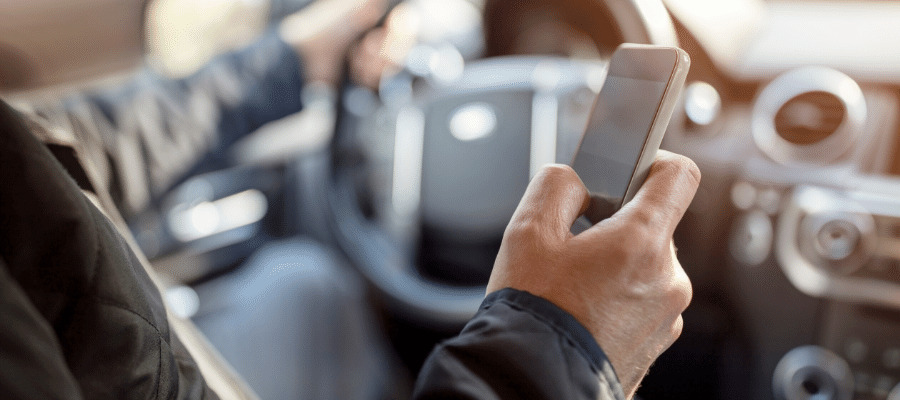Although texting and driving was banned in Massachusetts back in 2010, the number of distracted driving crashes in the Commonwealth rose 170 percent between 2014-2016. [1]
On Monday, November 25, 2019, Massachusetts Governor Charlie Baker signed into law An Act Requiring the Hands-Free Use of Mobile Telephones While Driving.
Sen. Mark Montigny, D-New Bedford, who has sponsored a hands-free bill every session since 2003, said, “While I am thankful that we have reached a final agreement, it is very hard to celebrate knowing this should have been dealt with years ago. Distracted driving has claimed the lives of far too many innocent people and wreaked havoc upon families, forever robbed of planning graduations, weddings, and holidays.”
“This bill is a vital step towards avoiding the many accidents caused by distracted driving,” said Senator James T. Welch (D-West Springfield). “With all of the technology available to assist in hands-free communication and navigation, there should be no reason that drivers are causing additional danger to the streets.” [2]
The law is commonly referred to as the “Distracted Driving Law” or the “Hands-Free Driving Law.”
Distracted Driving Law
The new law will take effect 90 days after passage on February 23, 2020.
The law provides for a grace period where drivers will receive a warning for their first violation through March 31, 2020. However, it’s important for drivers to remember that texting and driving has been outlawed in Massachusetts since the passage of the Safe Driving Law in September 2010; thus, infractions for typing and reading text messages will still carry full penalties.
Drivers cannot hold their mobile electronic devices while driving. Drivers cannot use mobile electronic devices while driving unless the device is in hands-free mode. The law allows for a “single tap or swipe” to activate or deactivate hands-free mode.
Drivers are not permitted to read or look images and videos while driving unless they are viewing something that helps with navigation AND the device is mounted in an appropriate location.
Exceptions
The law does not apply to first responders who are on duty and driving an emergency vehicle.
Further, evidence that the use of a mobile electronic device was in response to an emergency shall be an affirmative defense to an alleged violation of the law. This means that drivers are exempt from the ban on hand-held cellphone use while driving if they need to report an emergency such as that their vehicle is disabled, they require medical attention, police intervention, fire department, or other emergency services, or a disabled vehicle or accident is present on the roadway.
Drivers can use their phones while in their vehicle if they are stationary and not in an active lane of traffic.
Mobile Electronic Devices
Cellphones are the most common mobile electronic devices used by drivers. Defined as “any hand-held or other portable electronic equipment capable of providing data communication between 2 or more persons, including, but not limited to:
- mobile telephones,
- text messaging devices,
- paging devices,
- personal digital assistants,
- laptops,
- video gaming equipment,
- DVD,
- etc. [3]
Hands-free mode is defined as the operation of a mobile electronic device by which a user engages in voice communication or receives audio without touching or holding the device may require a single tap or swipe to activate, deactivate or initiate the hands-free mode feature.
Surchargeable Incident
A first or second offense under the Distracted Driving Law shall not be a surchargeable incident, meaning there will be no effect on one’s car insurance rates until a driver’s third offense.
Penalties
Once the grace period expires, starting April 1, 2020 – just in time for National Distracted Driving Awareness Month, the first offense will result in a $100 fine. [5] A second violation carries a $250 fine, and then $500 for a third violation and each subsequent offense. Anyone with two or more violations will be required to complete a distracted driving prevention program.
Are the Laws the Same for Bicyclists?
Cyclists are not considered operators of a motor vehicle and are not covered under the law. However, cell-phone use by cyclists can be dangerous and even negligent.
Limit Your Distractions
- Put Your Phone Away. Or better yet switch it to silent mode before beginning to drive. At no time while driving should you access your phone.
- Take Your Messages Later. Once you have parked and turned off the car you can answer your messages. You can even sign-up for a service that will automatically send a message telling callers you are driving.
- Pull Over. If you need to make a call, pull over to a safe area first.
- Use Your Passengers. Ask a passenger to communicate for you.
- Do Not Text. Don’t ever text and drive, surf the web or read your email while driving. It is dangerous and against the law in most states.
- Know the Law. Learn state and local laws before driving.
- Prepare for the Drive. Start your GPS or review maps and directions before you start to drive.
- Keep Pets Secure. Pets can be a big distraction in the car. Always secure your pets properly before you start to drive.
- Keep Distractions to a Minimum. Pullover to a safe spot to address situations with your children or any other people in the car.
- Focus on the Road. Refrain from smoking, eating, drinking, reading and any other activity that takes your mind and eyes off the road. [6]
Stay Out of Trouble
Police officers will have cause to pull someone over if a driver is on their phone. The law explicitly states, “No operator of a motor vehicle shall hold a mobile electronic device.” To protect your safety, your license, and your wallet just don’t use any mobile devices while driving otherwise you will be communicating with a lawyer. [4]
[1] https://www.mass.gov/service-details/distracted-driving.
[2] http://jimwelch.com/story/massachusetts-legislature-passes-distracted-driving-legislation.
[3] M.G.L. c. 90, s.1
[4] https://www.mass.gov/service-details/distracted-driving.
[5] https://www.mass.gov/service-details/distracted-driving.
[6] St. 2019, c. 122, s. 13B.

